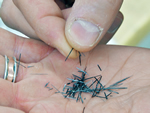 |
 |
 |
Aerospace giant Boeing Co. is teaming with Washington State University (WSU), and the Washington Stormwater Center to develop stronger permeable concrete or asphalt pavement through the use of carbon fiber composite material recycled from a Seattle aircraft assembly line. A $212,000 grant and material donation is funding investigations at the WSU Research and Extension Center, Puyallup, and WSU Pullman campus.
“Creating the opportunity to expand the use of permeable pavement is good for the environment and the communities in which we live and work,” notes Boeing Environment, Health & Safety Vice President Ursula English. “Water is one of our most precious resources, and we need to treat it as such.”
Investigators will recycle carbon fiber composites to strengthen and reinforce porous pavement material, which is used in parking lots and side roads, but lacks structural characteristics for typical mainline roadways. Sample pavement sections will then be evaluated for toxicity, confirming the composite material does not add pollutants into the soil or impact water quality.
“If we find that this material safely strengthens permeable pavement, resulting in an increase in its use, this could be a game changer in terms of reducing the impact of pollutants in stormwater on the environment,” affirms Washington Stormwater Center Director John Stark.
Boeing’s participation in the research stems partly from the Environmental Protection Agency’s categorization of the permeable pavement as a best management practice for stormwater. Likewise, Washington officials requires use of low-impact development techniques for managing runoff wherever feasible in western parts of the state.

|
| Washington State University investigators at the Puyallap and Pullman facilities will test performance of the Boeing-sourced carbon fiber in pervious concrete and asphalt pavement. |
